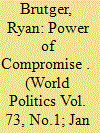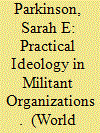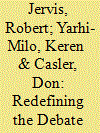|
|
|
Sort Order |
|
|
|
Items / Page
|
|
|
|
|
|
|
| Srl | Item |
| 1 |
ID:
179162


|
|
|
|
|
| Summary/Abstract |
In an era of increasingly public diplomacy, conventional wisdom assumes that leaders who compromise damage their reputations and lose the respect of their constituents, which undermines the prospects for international peace and cooperation. This article challenges this assumption and tests how leaders can negotiate compromises and avoid paying domestic approval and reputation costs. Drawing on theories of individuals’ core values, psychological processes, and partisanship, the author argues that leaders reduce or eliminate domestic public constraints by exercising proposal power and initiating compromises. Employing survey experiments to test how public approval and perceptions of reputation respond to leaders’ strategies across security and economic issues, the author finds attitudes toward compromise are conditioned by the ideology of the audience and leader, with audiences of liberals being more supportive of compromise. In the US case, this results in Republican presidents having greater leeway to negotiate compromises. The article’s contributions suggest that leaders who exercise proposal power have significant flexibility to negotiate compromise settlements in international bargaining.
|
|
|
|
|
|
|
|
|
|
|
|
|
|
|
|
| 2 |
ID:
179160


|
|
|
|
|
| Summary/Abstract |
Ideology shapes militant recruitment, organization, and conflict behavior. Existing research assumes doctrinal consistency, top-down socialization of adherents, and clear links between formal ideology and political action. But it has long been recognized that ideological commitments do not flow unaltered from overarching cleavages or elite narratives; they are uneven, contingent, fraught with tension, and often ambivalent. What work does ideology do in militant groups if it is not deeply studied, internalized, or sincerely believed? How can scholars explain collective commitment, affinity, and behavioral outcomes among militants who clearly associate themselves with a group, but who may not consistently (or ever) be true believers or committed ideologues? I argue that practical ideologies—sets of quotidian principles, ideas, and social heuristics that reflect relational worldviews rather than specific published political doctrines, positions, platforms, or plans—play a key role in militant socialization through everyday practices. Ethnographic evidence gained from fieldwork among Palestinians in Lebanon demonstrates how militants and affiliates render ideas about ideological closeness and distance accessible through emotional, intellectual, and moral appeals. This approach reaffirms the role of discourse and narrative in creating informal mechanisms of militant socialization without expressly invoking formal doctrine.
|
|
|
|
|
|
|
|
|
|
|
|
|
|
|
|
| 3 |
ID:
179159


|
|
|
|
|
| Summary/Abstract |
This article leverages a phenomenon of racial reclassification in Brazil to shed new light on the processes of identity politicization. Conventional wisdom tells us that race mixture, fluid racial boundaries, and stigmatized blackness lead Brazilians to change their racial identifications—to reclassify—toward whiteness. But in recent years, Brazilians have demonstrated a newfound tendency to reclassify toward blackness. The author argues that this sudden reversal is the unintended consequence of state-led educational expansion for the lower classes. Educational expansion has increased the exposure of newly mobile citizens to information, social networks, and the labor market, leading many to develop racialized political identities and choose blackness. The author develops and tests this argument by drawing on in-depth interview data, systematic analyses of national survey and longitudinal census data, and original survey experiments. This article contributes a novel account of identity politicization and emphasizes the interaction between social structures and citizenship institutions in these processes.
|
|
|
|
|
|
|
|
|
|
|
|
|
|
|
|
| 4 |
ID:
179163


|
|
|
|
|
| Summary/Abstract |
A wave of recent scholarship has breathed new life into the study of reputation and credibility in international politics. In this review article, the authors welcome this development while offering a framework for evaluating collective progress, a series of related critiques, and a set of suggestions for future research. The article details how the books under review represent an important step toward consensus on the importance of reputation in world politics, elucidating scope conditions for when reputational inferences are likely to be most salient. The authors argue that despite the significant accomplishments of recent studies, the scholarly record remains thin on the psychology of the perceiver and is instead focused on situational factors at the expense of dispositional variables and is rather myopically oriented toward reputation for resolve to the exclusion of other important types. Despite its contributions, the new literature still falls short of a full explanation for how actors draw inferences about reputation. These remaining theoretical challenges demand scholarly attention and suggest a role for psychology in filling some of the gaps.
|
|
|
|
|
|
|
|
|
|
|
|
|
|
|
|
| 5 |
ID:
179161


|
|
|
|
|
| Summary/Abstract |
This article problematizes the social structure of ethnic groups to account for variation in insurgent mobilization within and across ethnic groups. Relying on network-based approaches to social structure, it argues that insurgent mobilization is constrained by the structural connectivity of the ethnic group, a measure of the extent to which subethnic communities—neighborhoods, villages, clans, and tribes—are socially connected internally and with each other. In agrarian societies, structural connectivity is traced to religion. On the basis of unique data on rebel recruitment from the Mizo insurgency in India and microlevel variations in changes associated with the spread of Christianity among Mizos, the author demonstrates that enhanced structural connectivity resulting from a network of highly centralized churches and institutions under the Welsh Presbyterian Mission significantly bolstered insurgent recruitment. Semistructured interviews of Mizo insurgents and ethnographic evidence from the neighboring Meitei and Naga ethnic insurgencies further support the argument and the casual mechanism.
|
|
|
|
|
|
|
|
|
|
|
|
|
|
|
|
|
|
|
|
|